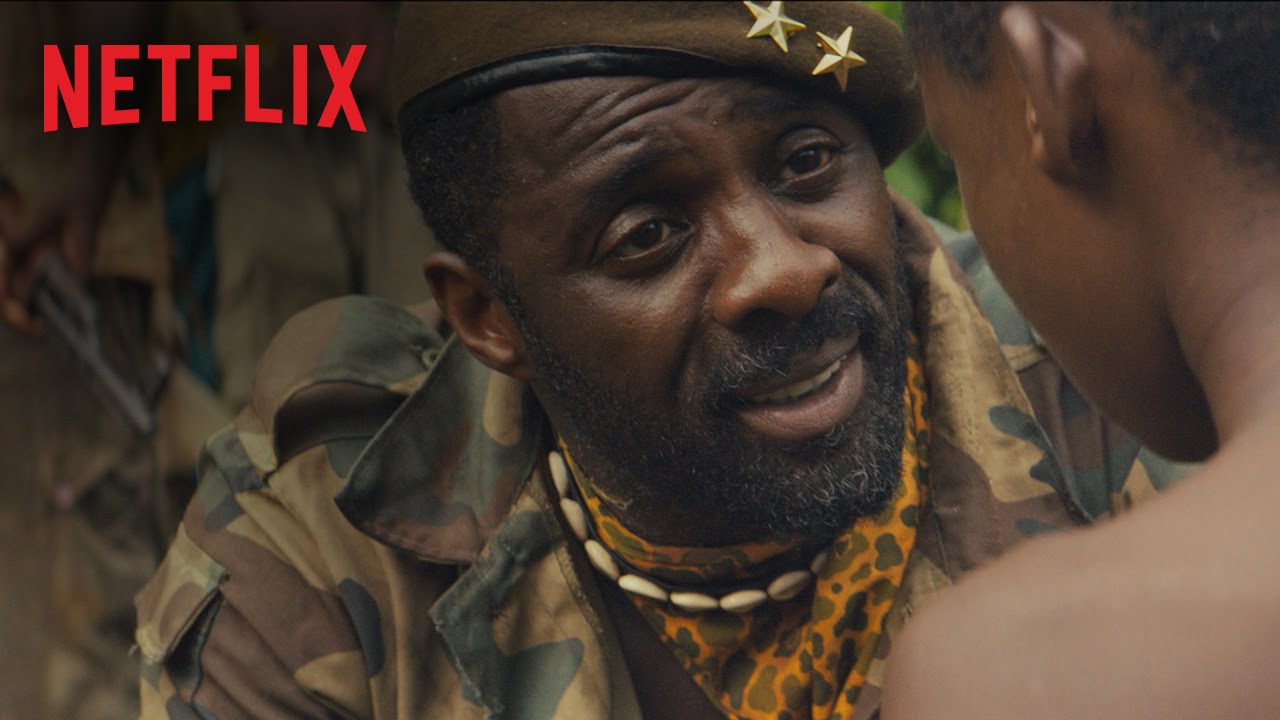by Hawa Adula
Cast: Idris Elba, Abraham Attah, Opeyemi Fagbohungbe, Richard Pepple
Director: Cary Fukunaga
It is easy to lose track of events that are happening outside our own little bubbles. There are so many horrific events happening around the world that we desensitize ourselves to in order to avoid becoming a jumble of emotions. Sometimes, though, sensitivity and emotions are necessary. After all there is a reason why we feel.
Beasts of No Nation forces watchers to confront a painful reality most wish they could ignore: the psychological ruin inflicted on child soldiers by war.
Agu is one such child soldier. Separated from his mother and forced to watch as military forces senselessly murder his father and brother, Agu reasons that he is avenging his family when he is forced to join a militia.
As the title suggests, the setting of the movie is not revealed. Watchers simply know that it is in an African country, and that the characters speak Twi, a language traditionally spoken in Ghana. The abstract nature of the movie suggests that the events that unfold in the movie, i.e. war, could happen anywhere in the world.
Cary Fukunaga, the director, does a good job of detailing the violences that constitute warfare: murder, rape, death. The few clear plot events that happen, such as the ransacking of towns, are vivid and clear. Nothing is left to the imagination. It is as if Fukunaga wanted this outright portrayal of violence and death to contrast the less explicit feelings of guilt, hurt, and confusion that surround Agu.
Agu is the focus of this movie, but the silence of Strika, another child soldier, speaks volumes to the powerful juxtaposition of external and internal violence that Fukunaga creates in the film. He is unable to talk: he does not speak of the war, he does not speak of his family, he does not speak of his emotions. The silence of Strika is the inability to comprehend, much less voice, the emotions that come with the murdering of children, mothers, fathers, and innocent people that Strika and Agu both participate in.
Agu feels guilty about the devastation that occurs and his role in it. He says “Sun, why are you shining at this world? I am wanting to catch you in my hands, to squeeze you until you can not shine no more. That way, everything is always dark and nobody’d ever having to see all the terrible thins that are happening here.”
The movie somehow finds a way to end on a positive note. We see that Agu and the other children in his militia are brought to a center that helps them cope with all they have seen and done in the war. However, we do not get to see enough of his progress once he is there.
This may suggest that the process of healing is never ending; that war may be temporary but its effects are permanent. Or maybe, it is a way of helping viewers understand what all recovering child soldiers want — to heal without the presence of prying eyes, to heal without being judged.
Beasts of No Nation is overall an informative and emotional film that is well worth the watch. Fukunaga incorporates humor, sadness, love, and healing and somehow they all come together to make a great account of the life of child soldiers. There is a lot to be learned and felt from this film, so let your emotions be put through the ringer without the shield of denial. Be unafraid to counter this unspoken inclination towards desensitization.
Beasts of No Nations is available for streaming on Netflix.


